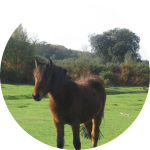|
When you own a horse you become responsible for its health.
Horses can become affected by many health problems such as
colic, thrush and internal parasites. A number of conditions
can be prevented and treated by an owner, but every horse
owner should have the aid of a local equine veterinarian.
Before purchasing your horse, you should have a veterinarian
give it an inspection to make sure that he is in good health.
Thereafter it is advisable to have your veterinarian give
your horse an annual checkup.
I was interested in purchasing a school master for show
jumping from the stable where I kept my horse. I really did
not have an in-depth knowledge of horses, but I knew enough
to request a veterinary inspection. I did not know any vets,
so I did not mind when the owner suggested using their local
veterinarian.
We had gone over the horse and all seemed to be going well
until we had him running loose in a lunge ring. I overheard
the veterinarian inquire as to whether I was planning on doing
much with the horse. I have no idea what he meant exactly,
but I did know I was planning on show jumping. Ultimately
I assumed that the horse had some health problems and would
not be a long term investment.
The owners did not divulge any of the veterinarian's words,
but I was saved from making a costly unsound investment. When
you buy a horse you usually part with a substantial amount
of money and it makes complete sense to ensure the health
of your investment.
Horses require regular upkeep, they need to be dewormed
and vaccinated regularly to prevent health problems and to
maintain good health. When you do not deworm your horse, he
becomes infested with parasites which can infect other horses
he is around and it affects his own health.
You may not see the internal damage worms create, but with
large infestations you will see the difference on the outside
when his coat is no longer glossy and he keeps losing weight
no matter how much you feed him.
When you look after horses you can do other prevention techniques
besides deworming, to increase chances of a good healthy environment
for your horse.
- Remove droppings from paddocks and fields on a regular basis.
If completely removing is not possible then disk or harrow
the field to break up the droppings.
- Rotate your pastures, leave a field completely empty for
a period of time
- Remove bot eggs from the horses with a bot knife
- Grazing with cattle can aid worm control
The usual vaccinations given to a horse are for equine influenza,
tetanus and equine encephalitis. It is strongly recommended
that you have all your horses vaccinated; your local veterinarian
will be able to assist you and determine which vaccines your
horse needs and when he should be given them.
Having a horse is a huge responsibility and they are reliant
on you for good health. Take pride in owning a horse and ensure
he is well cared for. Have a basic first aid kit at hand and
develop a relationship with your local veterinarian.
About the Author Get information on buying, owning and
caring for your horse, learn about horse
health |


